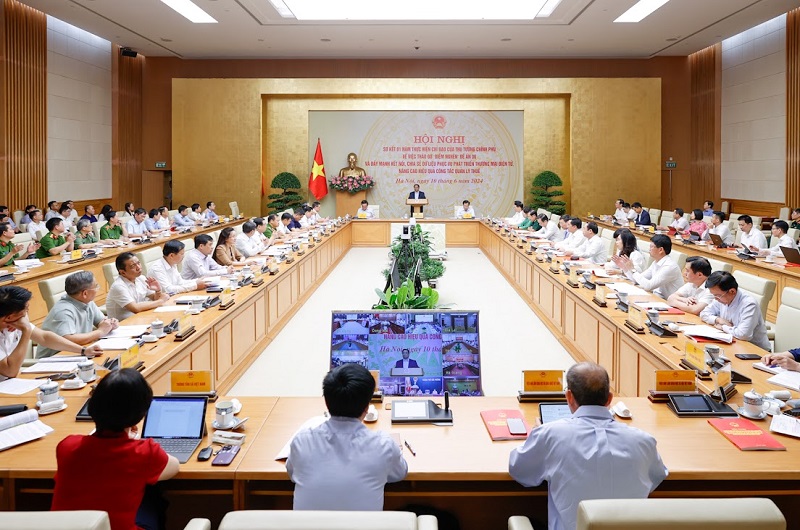Hanoi earns nearly US$390m from taxing e-commerce
The capital has made great strides in driving the digital transformation process.
As of June 2024, Hanoi has collected more than VND9.9 trillion (US$390 million) in taxes from e-commerce activities, said Deputy Chairman of Hanoi People's Committee Ha Minh Hai on June 10.
| Shop online at Shopee, one of the largest e-commerce platforms in Vietnam. Photo: The Hanoi Times |
The figure includes VND2.5 trillion ($98 million) in corporate taxes and VND7.4 trillion ($291 million) in taxes paid by household businesses, Hai told an online conference chaired by Prime Minister Pham Minh Chinh on developing an electronic database of residents, businesses and e-commerce activities for national digital transformation in 2022-2030 (Project 06).
According to Hai, Hanoi has imported e-commerce data from 418 enterprises and trading platforms, nearly 670 digital businesses, and some 366,000 e-commerce sellers.
So far, the capital has been operating an e-ticketing system for bus and metro lines and is on its way to introducing cashless payment at all parking lots in the metropolitan area. Nearly 71% of all parking fees are paid cashless, showing that it is a preferred means of payment that ensures transparency and convenience for people.
"Related parties are developing an app that enables cashless payment, issues e-invoices, and connects people with city and sub-municipal authorities," Hai said.
Hai added that Hanoi is also making great achievements in its digital transformation process, especially in building a residential database, integrating personal information into the VNeID app, and using digital solutions to make social security payments.
"We are well aware that Project 06 is the foundation for the development of e-government, digital economy, and digital society. This is the best way for us to take the shortcut and tap into green, sustainable, and rapid growth," said the Deputy Mayor of Hanoi.
Since Project 06 was launched two years ago, Hanoi's city and sub-municipal authorities have taken creative steps to reform the administrative structure, which has had a positive impact on the city's growth, Hai said.
Hanoi plans to continue to remove bottlenecks in the digital transformation process and develop new activities and ideas in this regard, the vice chairman added.
"Hanoi expects to receive support from the government's Project 06 task force to pilot the ideas. The capital will also work on new ways for better data sharing and a more cash-free economy to boost the city's digital transformation."
According to Nguyen Thi Hong, Governor of the State Bank of Vietnam (SBV), the central bank has been working closely with the Ministries of Finance and Public Security and other government agencies to develop solutions to ensure the national payment system, its transparency and security.
According to the central bank governor, the banking system processes 20-25 million transactions worth a total of VND830 trillion ($32.6 billion) every day.
In 2021-2022 and 2022-2023, the number of Internet and mobile-based transactions increased by 52% and 103%, respectively, from the previous year, while the number of transactions using QR codes surged by 170% in the same period. Approximately 87% of all Vietnamese adults now have a bank account. There are 182 million individual payment accounts and 147 active bank cards.
Hong noted that the central bank will continue to improve the banking system to support cashless payment and tax management and connect sellers with local tax authorities to manage cross-border trade.
"Taxpayer information is sensitive and confidential data. It's a big issue that requires joint efforts from financial institutions and the Ministry of Finance to synchronize the data, secure personal information, and fight tax evasion," the governor added.
Government initiatives to promote e-commerce
The Ministry of Industry and Trade will share the data of nearly 48,300 e-commerce websites and platforms with the General Department of Taxation, said Deputy Minister Nguyen Sinh Nhat Tan.
| The online conference on the national digital transformation. Photo: VGP |
The two ministries of finance and industry and trade expect to complete the synchronization of their administrative systems in June 2024, which is one year ahead of schedule, he said.
Tan also urged the Ministry of Public Security to come up with a master plan to require all citizens and businesses to use their chipped IDs for authentication when doing business on e-commerce platforms.
According to Prime Minister Pham Minh Chinh, the lack of data sharing among all localities and government agencies and poor cybersecurity management are the key factors for the slow progress of the national digital transformation.
He urged government agencies and local authorities to complete the national database of residents soon, be more creative in their work, and develop new rules for collecting and managing personal data.
All ministries must speed up the formulation of laws and regulations on e-commerce activities and the protection of consumers' rights and interests to prevent trade fraud, trade in counterfeit goods, and tax evasion, he said.
PM Chinh noted that relevant parties must take stronger measures to accelerate the development of national, provincial, and local database centers, which would facilitate a secure, consistent, and uninterrupted digital economy.
In addition, he urged government agencies to promote digital solutions in tax management, issue electronic invoices, regulate e-commerce trade activities, and strictly deal with potential violations.













